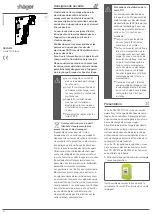
06
T
+49 541 760268-0
F
+49 541 760268-199 [email protected] hager.com – 08.2022
7 8 9
XEV304
10
1 2 3 4 5 6
11 12
Abo
15
20
25
30
35
EC
O
100
90
80
75
65
60
50
45
40
ON
ECO
1 2 3
To install the XEV304 or XEV305
simulator and configure the
product, refer to the instructions
provided with these products.
Technical features
Communication media:
by wiring through a twisted pair cable from an
electronic meter fitted with a previous generation
or standard TIC output.
Electrical specifications:
power supply voltage: ..............5 V
s
and 12 V
s
supplied by the controller via the flat cable
consumption: ......................100 mA max. for 5 Vs
and 4 mA max. for 12 Vs
Ambient conditions:
operating temperature: ...............-25 °C to +70 °C
storage temperature: ..................-25 °C to +70 °C
pollution level: .....................................................2
insulation class: ..................................................III
maximum operating altitude: .....................2000 m
surge voltage: .................................................4 kV
Connection:
TIC input: ......0.2 to 2.5 mm² / Stripping: 10 mm /
dual-insulated cable / length: 500 m max.
wired TIC card
and controller card: ............ Micromatch 2x10-pin
flat cable (supplied)
EU declaration of conformity:
The declaration of conformity is only valid
when the card is installed in the charging
station, in accordance with the regulations
and best practices set out in this document.
Failure to comply with the installation or
assembly instructions is prohibited and does
not render Hager liable.
It is preferable to use a remote
energy meter cable or, failing
that, a telephone-type twisted
cable.
An R02V cable should not be
used.
I1 I2 A
3
The TIC cable should be fastened using
the 3 cable clamps provided on the socket
support side.
x 3
4
Connection with TIC XEV304 (for single-
phase network) or XEV305 simulator (for
three-phase network):
When an electronic meter is not available,
Hager offers a TIC simulator that enables
dynamic management of the vehicle charge
and thus prevents accidental outages
caused by an overload in the domestic
electricity network.
It is preferable to use a remote
energy meter cable or, failing that,
a telephone-type twisted cable.
An R02V cable should not be used.
























